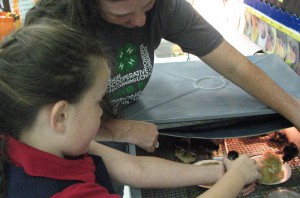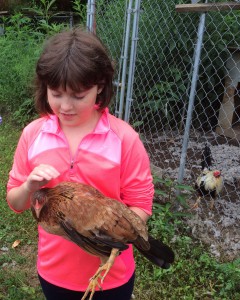 It’s almost Easter when lots of people think about those cute little chicks. Before you take on one of those cute little animals– let’s talk about the responsibilities and considerations when raising chickens
It’s almost Easter when lots of people think about those cute little chicks. Before you take on one of those cute little animals– let’s talk about the responsibilities and considerations when raising chickens
Keeping chickens isn’t much different than keeping pets – they need to be fed and watered every day and, yes, you have to deal with poop. However, most local veterinarians won’t check chickens, so you’ll also need to monitor your birds to know if a health intervention is needed. Handling and socializing your chickens from an early age makes it easier to get them to cooperate, but it also makes it more fun for you to enjoy their antics and unique personalities. If you’re thinking about getting chickens, the first thing to ask yourself is “why?” For human food production, self-sufficiency, selling eggs, entertainment, education for kids or simply as pets? Owning chickens can be all of these  things. Your “why” will help you determine how much you want to invest, as well as guide you to what kind of chickens and coop you will need.
things. Your “why” will help you determine how much you want to invest, as well as guide you to what kind of chickens and coop you will need.
Everything from a few backyard chickens to 4-H projects and farms with several hundred chickens can be considered “small”. Just because a flock is small, does not mean that stewardship, efficient production, safe handling, and other rules can be ignored. Keeping a small flock of chickens for home use, a practice commonplace during our grandparents’ time, is becoming popular again. If you are considering this, you will need to educate yourself about poultry feeding, health and egg production, as well as food safety. There are many University publications on the web.
The University of Florida’s Institute of Food and Agricultural Sciences Extension has several articles on keeping chickens. UF/IFAS Extension has a section devoted to backyard poultry , Basic Guide for the Backyard Chicken Flock, which includes information about brooding, housing, feeding and nesting needs of birds. Other sites include: Escambia County Backyard Poultry Guide and Urban Farming Chickens 101. Other universities with excellent Extension resources to help with backyard poultry include: Mississippi State; Penn State; Purdue Extension; Colorado State Extension; a University of Minnesota and The University of Illinois Extension lists 33 resources on poultry. Another useful site is Illini PoultryNet.
Taking care of the chicks provides a fun way for kids to develop a sense of responsibility, while teaching them work ethics and healthy eating habits. Other ways your children could participate in 4-H and learn about poultry include: The 4-H & Farm Bureau Ag-in-the Classroom Embryology School Enrichment program offered in many counties. There are other activities that youth can engage in including poultry production, judging of poultry and poultry products, preparing foods using poultry and public presentations to inform others about chickens and poultry. Youth can compete in activities at the county, district, state and national levels. 4-H is one of the nation’s most diverse organizations and includes people from all economic, racial, social, political, and geographic categories. There are no barriers to participation by any young person. Participants are given the opportunity to engage in activities that hold their personal interest, while being guided by adult volunteers. The local 4-H Agent is a youth development professional who provides direction and program leadership as part of the nationwide Cooperative Extension System. For more information, contact your local UF/IFAS Extension Office or check out our web-site.
- Recycled Arts for the Fair - October 24, 2024
- Grow a Blue Ribbon Plant - August 28, 2024
- Creating Holiday Gifts Together - December 1, 2023
